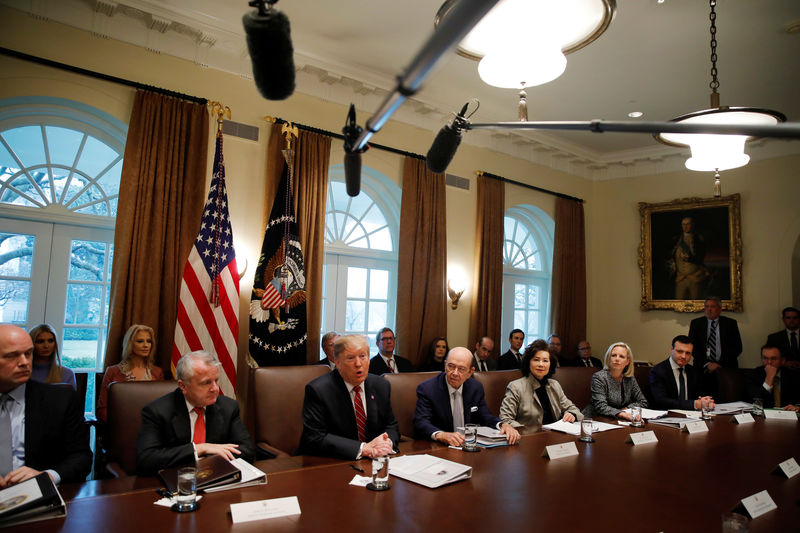By Susan Cornwell and Richard Cowan
WASHINGTON (Reuters) - President Donald Trump expressed displeasure on Tuesday at a deal by congressional negotiators on border security that denied him funds for his promised U.S.-Mexican border wall, but did not reject it outright as fellow Republicans urged his support.
Trump, who triggered a 35-day closure of about a quarter of the federal government with a December demand for $5.7 billion from Congress to help build the wall, said he had yet to decide whether to back the agreement reached on Monday night by four key Republican and Democratic lawmakers.
Nevertheless, Trump signaled he did not expect another shutdown and hinted again at bypassing Congress to get his wall built. Funding for the Department of Homeland Security, the Justice Department and a host of other agencies is due to expire on Friday under the stopgap spending measure passed last month by Congress to end the longest federal shutdown in U.S. history.
"I have to study it. I'm not happy about it," Trump told reporters at the White House about the tentative funding deal, which would need to be passed by the Democratic-led House of Representatives and Republican-controlled Senate and signed by him.
The deal included border security provisions and money to keep the affected parts of the government funded through Sept. 30, the end of the federal fiscal year.
Congressional Republicans have shown little appetite for another shutdown after taking heavy criticism over the prior one. "I hope he'll decide to sign it," Senate Majority Leader Mitch McConnell told reporters, even though Trump did not get everything he wanted. House Republican leader Kevin McCarthy also touted the deal.
Trump sent mixed messages about another shutdown.
"I don't think you're going to see a shutdown," Trump said, but he added: "If you did have it, it's the Democrats' fault."
Congressional sources said the agreement included $1.37 billion for new fencing - about the same as last year - along 55 miles (90 km) of the border but only with currently used designs such as "steel bollard" fencing. It also addressed capacity at immigration detention facilities, specifically the number of beds for people awaiting possible deportation.
Trump previously threatened to declare a "national emergency" if Congress did not provide money specifically for the wall, an action under which he might redirect other funds already provided by Congress to pay for wall construction. Fellow Republicans have told Trump such a step would almost certainly prompt a legal challenge.
'WE'RE BUILDING THE WALL'
On Tuesday, Trump signaled possible unilateral action.
"The bottom is on the wall: We're building the wall," Trump said, adding: "We're supplementing things, and moving things around, and we're doing things that are fantastic and taking, really, from far-less-important areas."
Republican James Inhofe, who heads the Senate Armed Services Committee, told reporters that he urged Trump weeks ago not to raid Pentagon accounts to build a wall. Inhofe indicated Trump could try to use Army Corps of Engineers funds.
Trump made the wall a central 2016 campaign promise, calling it necessary to combat illegal immigration and drug trafficking. He said Mexico would pay for it, but Mexican officials rejected that. Democrats have called a wall expensive, ineffective and immoral.
McConnell, who had counseled Trump against the previous shutdown, said Democrats had abandoned "unreasonable" demands. McCarthy told CNBC that Democrats had caved by allowing the new border fencing. The border barrier funding was far short, however, of the $5.7 billion in wall money Trump wanted and was less than Trump could have had in compromise legislation passed in December by the Senate.
Democrats said the formal legislation should be ready by Wednesday, leaving little time for Congress to pass the measure by Friday's midnight deadline.
Senior Democrats threw their weight behind the deal and said both sides gave ground. Top Senate Democrat Chuck Schumer said: "I strongly urge the president to sign this."
Tom Graves, a House Republican who serves on the congressional conference committee that worked on the issue, raised concerns about the compromise. But Mark Meadows, who heads the conservative House Freedom Caucus, said he expected Trump would sign it.
Trump retreated last month when he agreed to end the shutdown without getting wall money. The shutdown roiled financial markets and left hundreds of thousands of federal workers and contractors without pay. Trump will now have to decide whether to side with conservative commentators who have his ear including Sean Hannity of Fox News, who late on Monday called the deal a "garbage compromise."
Democrats oppose the wall, but support border security efforts. The number of beds in detention facilities was a contentious part of the negotiations because it can either constrain or expand the administration's ability to aggressively deport more immigrants, including those seeking asylum.
Congressional aides on Tuesday gave differing accounts on the number of beds the deal permitted, with some saying it would drop to 40,520 by later this year and others saying it could rise to 58,500. Democrats had sought to limit the number.
